








MY STORY Hope in the middle of grief FEATURE Learning your language FAITH TALK Everyday wonders Vol. 005 | No. 07 9 March 2024 AUD $1.00 PRINT POST APPROVED PP100001474 salvosonline.org.au
Telling a new story about difference
Revealing autism
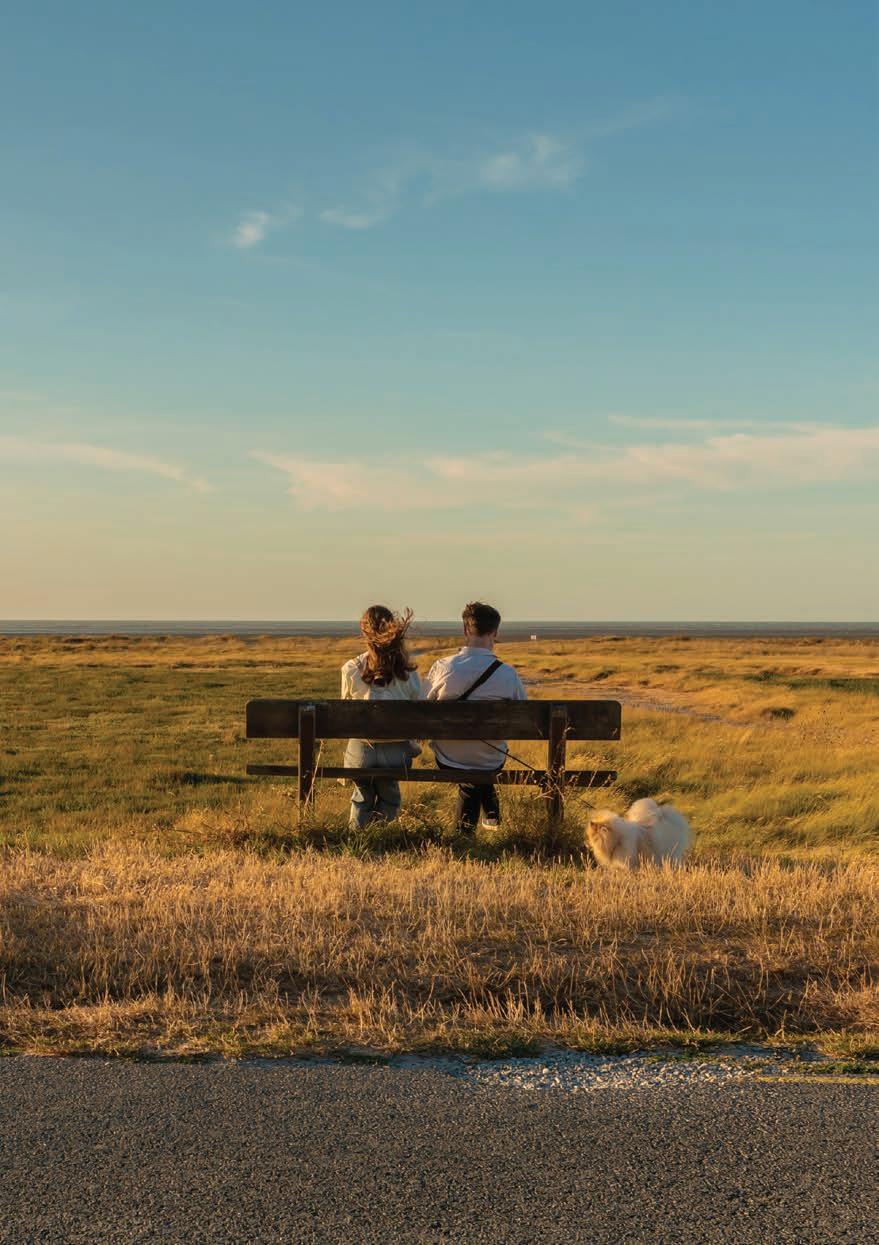
“Worthiness doesn’t have prerequisites.”
– Brené Brown
The Salvation Army is about giving hope where it’s needed most.
What is The Salvation Army?
The Salvation Army, an international movement, is an evangelical part of the universal Christian Church.
Vision Statement
Wherever there is hardship or injustice, Salvos will live, love and fight alongside others to transform Australia one life at a time with the love of Jesus.
Mission Statement
The Salvation Army is a Christian movement dedicated to sharing the love of Jesus by:
• Caring for people
• Creating faith pathways
• Building healthy communities
• Working for justice

The Salvation Army Australia acknowledges the Traditional Owners of the land on which we meet and work and pay our respect to Elders, past, present, and future. We value and include people of all cultures, languages, abilities, sexual orientations, gender identities, gender expressions, and intersex status. We are committed to providing programs that are fully inclusive. We are committed to the safety and well-being of people of all ages, particularly children.
Salvos Magazine
Founders William and Catherine Booth
Salvation Army World Leaders
General Lyndon and Commissioner Bronwyn Buckingham
Territorial Leader Commissioner Miriam Gluyas
Secretary for Communications and Editor-In-Chief
Colonel Rodney Walters
Publications Manager Cheryl Tinker
Editor Simone Worthing
Graphic Designer Ryan Harrison
Enquiry email publications@salvationarmy.org.au
All other Salvation Army enquiries 13 72 58
Press date 23 February 2024
Printed and published for The Salvation Army by Commissioner Miriam Gluyas at Focus Print Group, South Granville, NSW, Darug Nation lands.

salvosonline.org.au


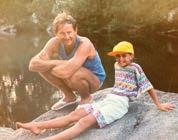
A new lens on life
In this edition of Salvos Magazine, we look at the gift of life through the experiences of a range of people. This includes our feature stories from two different parents with neurodiverse children, a busy mother and pastor trying to emerge from distractions to notice and enjoy the beauty all around her, and a Salvos journalist finding hope in the middle of grief.
As the parent-authors share, neurodiverse children, like all children (and adults), are unique in their own ways, but all made in the image of God. To include and empower neurodiverse people, the need to see neurodiversity anew is critical, beginning with goodness at the heart of all people and seeing each one’s uniqueness.
The Salvos Magazine team also introduces a new occasional column – Off the Shelf – that focuses on books and all things reading. Andrea Redford kicks off the column with some tips on overcoming a reading slump – something that every bookworm has experienced.
We hope you find a message of help, hope and encouragement within these pages. For these stories and more, go to salvosonline.org.au
Simone Worthing Editor
My Story [12] Life is a gift Faith Talk [10] Everyday wonders Feature [4] Learning your language
CONTENTS 3 9 M ARCH 2024
Learning your language
Communicating with neurodivergent people
By Penni Roden
Have you ever had a recurring nightmare that you wake up in a foreign country where you don’t speak the language, you don’t know anyone, you don’t know why you are there and you forgot to put pants on? Or is that just me?
For some of us, it’s a silly anecdote to tell around the water cooler the next morning. But for others, it’s a little too close to home. What is it about an inability to communicate that causes us to feel out of control, isolated or vulnerable? Biology. And survival. When we are surrounded by people who are like us, we feel safe and connected. But when we are surrounded by people who are different from us, we might feel unsafe, disconnected, isolated.
WELCOME TO HOLLAND
Emily Perl Kingsley worked for decades on Sesame Street and is a prolific producer of children’s media. She has been nominated for over 40 Emmy Awards, has won over 20, and has a long list of outstanding achievements. She is perhaps best known, though, for her poem Welcome to Holland.
In Welcome to Holland, Kingsley puts language around how it feels for a parent to learn that their child has a disability. She talks about planning a holiday to Italy but landing instead in Holland. You’ve studied Italian. You’ve planned an itinerary featuring Rome, Tuscany, the Vatican, espresso in the mornings and gelato after dinner. But you step off the plane in Holland instead. It’s important to understand that Holland (a geographical region on the
western coast of the Netherlands) is not inferior to Italy. It’s just different. You need to switch from Italian to Dutch. Luckily, there’s an app for that. You start reading up on windmills, tulips and clogs. You adjust to living below sea level instead of near the Alps. Riding bicycles. Eating Lebkuchen and pickled herring.
It takes a minute. And that’s okay.
You learn to let go of your expectations and find what works for your child.
PARENTING A NEURODIVERSE CHILD
As a mother who has been there, I relate. When you are told that your child isn’t going to be like “other children”, you learn to let go of your expectations and find what works for your child. You might need to find a new lens through which to look at the world. A new way of understanding the world or moving through it. A new way of communicating with and for your child.
When I was growing up, disability was often hidden away. It was common for parents to be told their child would never live a “normal” life so they should be placed in an institution. Patients (or inmates) were often infantilised
SALVOS MAGAZINE 4 FEATURE
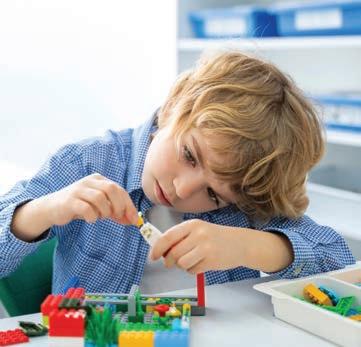
– treated like small children, regardless of their age.
Thank God we know better now.
TIPS FOR COMMUNICATING
However, the age of exclusion has left behind a large cohort of people who may feel uncomfortable, under equipped, under resourced or unsure how to communicate with someone who has communication challenges.
Here are my top three tips:
1. Watch them. Pay attention to how their family communicates with them. Do they use PEC (picture exchange) systems? Do they use a device that translates text to speech or vice versa? Artificial intelligence? Non-verbal cues? Sign language? Get curious. And then get creative. I discovered that one of my children needed a physical prompt to receive verbal instructions when he was riding his tricycle and I knocked on his helmet before I gave him the next cue. Game changer!
2. Ask them, or their carers. It might take a bit of charades, sign

language or note writing. But “How can I best communicate with you?” is one of the most empowering conversations you can have with a person who needs support to communicate. Can you imagine if no one had thought to give Stephen Hawking a voice?
3. Respect them. And model respect. Be patient with someone who stutters. Look over the shoulder of someone who can’t make eye contact with you. Speak gently to the child who screams. Break instructions down into simple chunks and give them one at a time. Honour what makes them, them. Speak their language, even if that means reading up on World War II history, or trains, or the building of the Titanic. Connection matters.
And if you have a chance to watch an episode or two of Sesame Street, maybe make a note of all the different ways the characters communicate with one another.
Major Penni Roden is a Salvation Army officer (pastor) in Queensland.
5
FEATURE
9 M ARCH 2024

Revealing Austism
Telling a new story about difference

I am afraid of how people might see them, of what society might do.

An honest, raw, thought-provoking and challenging reflection from a parent of a child with autism.
I am hiding a part of myself; my right arm hooked around my waist, my hand tightly curled in my back pocket. I stand to one side and hold a conversation like this, replying to other parents, my arm out of sight. I finish, then slip away to the carpark. The noise and movement of the school drop off is over, and I pull my arm out from behind me. A small, pale pattern trails up my forearm, the marks of teeth still in my wrist. I breathe. I have been hiding my right hand. I am hiding bite marks.
Autism is becoming more visible, with Australia having some of the highest rates of autism diagnosis among children in the world. One in 25 children aged seven to 14 are diagnosed on the autism spectrum, but people don’t always know what to think about it. Australia is looking at autism more than ever, but as the parent of an autistic child you can sometimes face a dilemma; autism can’t be hidden in our society anymore, but people don’t always know how to respond.
WHAT IS AUTISM?
I am the parent of an autistic child. The school drop off that morning had followed an outburst of panic, a meltdown. It happens often in our home – shouting, kicking, sometimes biting –when our child becomes overwhelmed. You learn to hide it; closing the front door when it starts, parking further away, turning down invitations if it all seems too much. You learn to hide your right hand when it is bitten. In a sense, you learn to hide a part of your child.



Autism is a collective term for a group of neurodevelopmental traits that can affect someone’s social interactions, communication, behaviours and sensitivities. Autism is naturally occurring and lifelong, presenting in different ways, with different degrees of challenges. Some may consider autism a disorder or a disability, seeing the ways it impairs someone, and think it can be treated or fixed. Until the 1980s, autistic children with more significant challenges were often institutionalised.
It can be harder for autistic children to make friends, learn, and participate in our communities as a result. When autistic children are unable to do these things, they can often be excluded, disadvantaged, even punished. Autistic young people in Australia today are less likely to finish school and more likely to encounter the juvenile justice system. A 13-year-old autistic boy was targeted

FEATURE
SALVOS MAGAZINE 6


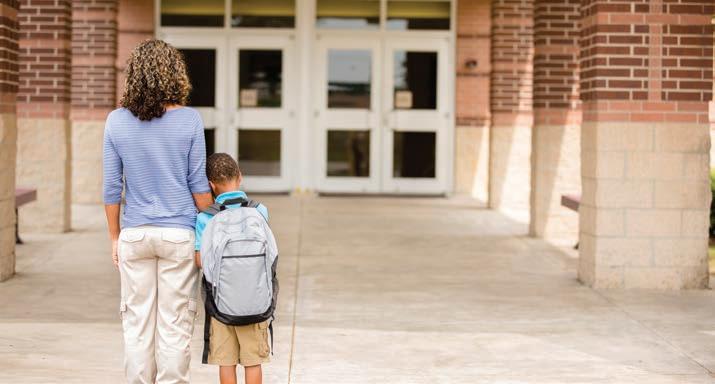
online by police in 2021 and charged with terror offences, after his parents had first sought help from authorities. (A court dismissed the charges last year.)

I know how some people can respond to my child, when a meltdown comes, when it all becomes too much. I know how some see the shouting, the kicking, the biting. I know how my child might be viewed by schools, workplaces, strangers, the police. I know what some may think – that there is something wrong with my child, that they are bad. I don’t want to hide any part of my child, but I am afraid of how people might see them, of what society might do.
MADE IN GOD’S IMAGE

I sometimes think about the biblical story of creation. The story, at the beginning, portrays the world as a place made up of distinctions, differences that grow over time. The world is made of light and dark, earth and water, and the story sees humanity as part of this creation. People are shaped from the earth, but with something divine within. This story tells us that creation, with all


its differences, is “good”, and that all people are made in the image of God. The story our society can tell about autism is often incomplete. The traits of autism can be impairing, but these traits can also be unique, allowing for passion, intelligence and joy. Some might see my child as bad, but they don’t see my child the way I do, how sweetly my child sings, how tightly they hold you, how big they smile. (It’s the smile that stays with you.)
No autistic child should be hidden.

LETTING GO
There isn’t something wrong with autistic people, there’s something wrong with how we can see them. We can choose to see autism anew, as something unique, to be included and empowered. Autism has its difficulties,


FEATURE
9 M ARCH 2024 7


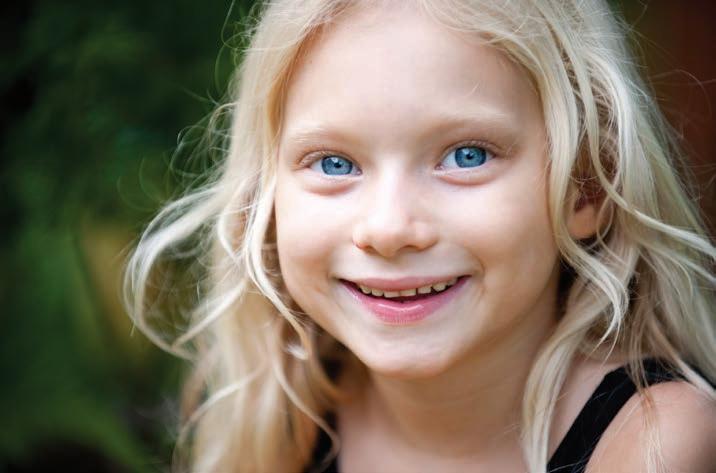
but there isn’t something wrong with autistic people because they’re different. There is something divine in how they are different, a revelation of God.
Bite marks fade, but have you seen that smile?

I am holding a part of myself, my arm hooked around a small waist, my right hand curled around my child’s. I stand with them, as they hug me tight. The noise of the school drop off is overwhelming. I breathe, with my child, and when they are ready, I let them go. I still don’t get this right all the time. I have learned to hide parts of my child. I must also learn to hold them, and to let them



go, to let people see them, and all that they are.
Autism is more and more visible in Australia, so we are going to have to tell a new story about it, one of inclusion and empowerment. This story must start at the beginning, with goodness at the heart of all autistic people, and must go on to change schools, workplaces, churches, the health and justice systems.
No autistic child should be hidden. They are a picture of the divine and the unique differences that make up the world. Bite marks fade, but have you seen that smile? It’s a revelation.
*Names withheld to protect privacy.

Scan here for more stories of hope.
FEATURE
SALVOS MAGAZINE 8

Off the Shelf
eAn occasional column on all things books and reading

Reading slumps
They happen to even the most committed bookworms. You scan the bookshelf at home – nothing appeals. You browse the shelves at your local library – nothing jumps out. Your friend enthusiastically recounts the plot of their latest read – sounds dreadful. What to do?
Whether you’re an avid reader in a literary rut or someone who’d simply like to read more, here’s a few tips to get those pages turning.
SET A 20-MINUTE TIMER.
Pick any book you’ve been meaning to read and just start, for 20 minutes. When you think about how quickly 20 minutes whooshes by when scrolling social media or news headlines, the same time with your nose in a book doesn’t feel too daunting.
REVISIT A FAVOURITE.
The only sure-fire way to guarantee a book will be a winner is to reread a favourite from the past. And while the characters and storyline won’t have
changed, there’s every chance that you have, even in some small way. Revisiting a book can be enormously satisfying as it brings new insights and an appreciation for things missed the first time around.
KEEP IT SHORT AND SWEET.
If fiction is your usual go-to, try a short story collection. Far less daunting than a 500-page doorstop and a great way to try a new-to-you author.
CHOOSE A BOOK WITH SHORT CHAPTERS.
You are far more likely to squeeze in one more chapter when it’s not 40 pages long.
BANISH YOUR SMARTPHONE TO ANOTHER ROOM.
The lure of a smartphone within arm’s reach can be hard to resist. If you (like so many of us!) often find yourself picking up your phone for no good reason, it is definitely going to come between you and a good book.
Happy reading!
–
Andrea Redford
9 OFF THE SHELF
9 M ARCH 2024
Everyday wonders
Emerging from distractions to see the beauty all around
By Belinda Davis
If I suggested that we head off on a long car drive, what would your response be? One of excitement or one of dread? I would fall into the second category – I am not a road trip fan much at all. I can often feel trapped, restricted, unproductive and bored!
I have concluded that technological devices make this experience much worse. My children have not experienced long car drives with nothing more than a book to read or pages to colour in. They have iPods and iPads and DVDs to amuse themselves – to the point that we could drive through amazing terrain and experiences and they would barely even look up, let alone notice.
A topic for another day is the relationship between being bored and creativity and imagination . . .
LOOKING UP
I have always been able to do things that require concentration in a moving vehicle without feeling ill. However, to avoid being bored, I usually take too many things to keep me engaged.
The downside of this is that my supplies need to be stored at my feet and so I end up being ridiculously cramped. On our adventures over the years I have hand-sewn quilt blocks, knitted jumpers, worked on cross stitch projects, written, read, coloured, played Candy Crush, planned and snoozed.
What I have noticed, however, is that I can easily miss the beauty of the countryside around me, especially in the ever-changing landscape that is regional Australia. You can be driving alongside bright green pastures one minute,

SALVOS MAGAZINE 10 FAITH TALK

stretches of flat, dry paddocks with livestock the next, and then moments later through lush forests in rolling mountainous terrain. I try to make it a practice now to regularly look up from my activities to observe the world around me and the beauty God has provided for us to enjoy.
I try to make it a practice now to regularly look up from my activities . . .
NATURAL WONDERS
There are times in life when I get so preoccupied with tasks that I forget to take a moment to breathe and appreciate the beauty all around me. It is an easy trap to fall into, especially in this age of busyness and constant activity.
I do not believe that being distracted from our surroundings is how God wants us to navigate through life. A beautiful verse in the Bible says: “. . . are you listening? Have you noticed all this? Stop in your tracks! Take in God’s miracle wonders!” (Job chapter 37 verse 14, The Message paraphrase Bible).
When I take a moment to engage with the natural world, it re-energises me to more effectively face the tasks that lie ahead.
Choose with me to notice your environment and be amazed by what beauty God has provided for us, rather than stock up on extra activities to stop being ‘bored’.
Major Belinda Davis is a Salvation Army officer (pastor). She blogs at a-blessed-life.com
Scan here for more stories of hope.
11 FAITH TALK
9 M ARCH 2024
Life is a gift
Choosing hope in the middle of grief
By Lauren Martin
I grew up in a family that was not religious but was very loving. One of my favourite childhood memories is that my parents owned a caravan park and I loved to spend school holidays with all the kids who would come and stay at the park, riding my bike and building cubbies.
I really wanted to be a journalist; it’s all I wanted to do since I was a kid. (I even used to type my own ‘newspaper’ on a typewriter, photocopy it and sell it for five cents at our caravan park!)
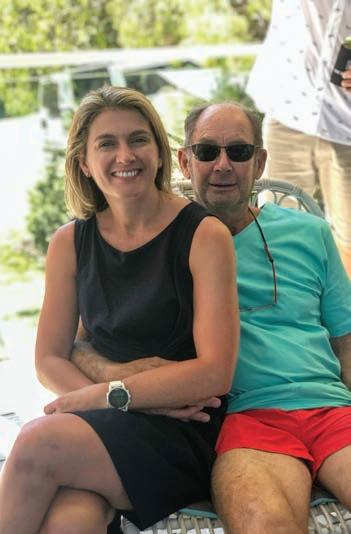
LIFE CHANGES
As part of my journalism course, I had to get something printed. I knew that the Salvos gave out a free magazine so I thought to myself – well, I can ask them if I can write an article for their magazine because they’re really nice and they won’t be able to say no! That’s how I first met the Salvos and that’s when my life changed.
That sense of unconditional love, passion and purpose for life – it really took a hold of me . . .
I met this couple – Hilton and Joyce Harmer – and they were court and prison chaplains. They fascinated me because they had such love for all people, even people that I would have stereotyped as ‘bad people’, like people in jail. They talked to me about how God created and loves all people. That sense of unconditional love, passion and purpose for life – to do their bit to make our world a better place and see people’s lives transformed – it really took a hold of me, and I wanted to follow Jesus too!
SALVOS MAGAZINE 12 MY STORY
Lauren and her beloved Dad, Phil.
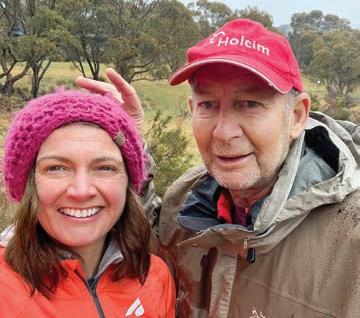
A TOUGH YEAR
Last year was a hard one. I wasn’t at work for stretches of time because my dad was dying of brain cancer. I took time off to help care for him in his final stages, and he passed away on 1 October. It’s been a huge blow for me, and I have to say that it kind of broke me a bit. The grief and the trauma of caring for a loved one in the end stages of life, it’s tough.
God – and my beautiful family – were the only things that helped me to keep going. I have clung to Jesus, and just knowing that God is with me and loves me has helped me to get up every day and keep going. It sounds a bit dramatic I guess, but the pain I feel sometimes is intense.
Life is never easy right? There are always going to be ups and downs. But sometimes pain and suffering, trauma and hurt can get us stuck. We can get weighed down by hopelessness and despair, give up on life, give up on trying.
LIFE CHOICES
But you know what? God is an amazing, loving God. One of the first gifts he gave humans was the gift of free choice. We
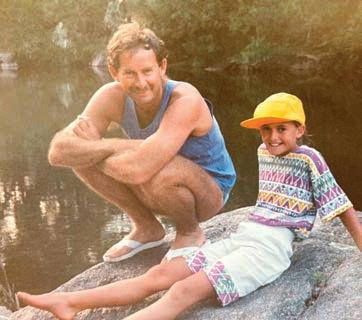
can choose goodness and love and light, which is the way of Jesus . . . or we can do our own thing. So, when I was faced with watching my father – my best friend and hero – die too young, I had a choice. Do I choose anger, bitterness and defeat? Or do I choose the way of Jesus and cling to the hope that God is with me, that he loves me deeply and that he has a purpose for my life, one that involves joy, even in times of hardship?
My dad used to have this saying, after he was diagnosed with terminal cancer. I would call him up, like I did every day, and ask how he was going and he would say, “Well, I woke up this morning and I’m still sucking air, so it’s a good day!”
Impending death has a way of making us appreciate life, right? My challenge for myself – and for all of us – is to live like that every day. Because life is a GIFT, so, what are we going to do with it?
Scan here for more information on Salvation Army services.
13 MY STORY
9 M ARCH 2024
Lauren and her special memories of time with her dad since she was a child.
Irish Stew

Ingredients
1kg lamb, 1 large onion, 2 carrots, 1 parsnip, 3 large potatoes, 1 tbsp oil, salt and pepper to taste, 3 cups chicken or beef stock, 1 cup chopped leeks, 1 tbsp rosemary, fresh parsley or mint to garnish
Method
• Cut lamb and vegetables into 3cm cubes.
• Add oil to a crock pot and cook lamb until browned. Season with salt and pepper.
• Add onion, carrots and parsnips with stock. Cover and bring to boil.
• Reduce heat and simmer 1 hour until lamb is tender.
• Add potatoes, leeks and rosemary. Simmer uncovered 30 minutes until potatoes are tender.
• Serve sprinkled with parsley or mint.
Have a laugh
What did the triangle say to the circle? You’re pointless.
What is a math teacher’s favourite season? Summer.
You know what seems odd to me? Numbers that can’t be divided by two.
What is a math teacher’s favourite vacation destination? Times Square.
Signing In
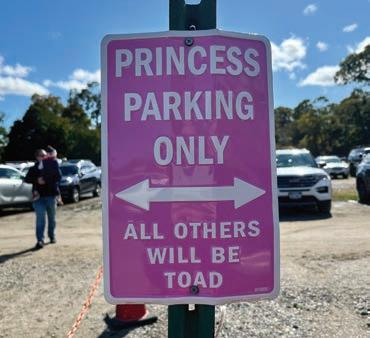
SALVOS MAGAZINE TASTE OF LIFE
Sudoku
Fill in the grid so that every row, every column and every 3x3 box contains the digits 1 to 9.
Quick quiz
1. Who was the first Disney Princess?
2. What colour are Mickey Mouse’s shoes?
3. What year was the movie Cinderella released?
4. What was Mickey Mouse originally named?
5. Which character have both Glen Close and Emma Stone played?
On which page of this week’s Salvos Magazine is Tum-Tum hiding?

Bible byte
“I will receive everyone; I will not send away anyone who comes to Me.”
John chapter 6, verse 37b
The Voice Bible translation
6. Which Disney movie has had the most sequels?
9 March, 1959
The Barbie doll goes on sale. More than one billion Mattel Barbie dolls have been sold.
10 March, 1876
The first telephone call is made. Alexander Graham Bell transmitted the words, “Mr Watson, come here –I want to see you.” Thomas A Watson, his assistant, was in the room next door.
13 March, 1781
Uranus is discovered.
The third largest planet was discovered by German-born British astronomer William Herschel.
15 March, 1972
Francis Ford Coppola’s
The Godfather is premiered.
Based on Mario Puzo’s novel, the movie is one of the most popular films of all time.
15 TAKE FIVE Quiz :answers 1. Snow White 2. Yellow 3. 1950 4. Mortimer Mouse 5. Cruella de Vil 6. Toy Story (4) :Tum-Tum is hiding behind a jacaranda on page 11.
6 9 8 3 4 9 9 5 3 2 7 5 6 3 3 2 8 4 6 3 1 9 8 8 7 2
1 6 5 9 8 3 4 7 2 7 3 4 2 1 6 5 8 9 2 8 9 5 4 7 1 6 3 8 1 2 7 5 9 6 3 4 9 5 3 8 6 4 2 1 7 6 4 7 3 2 1 8 9 5 4 7 8 1 9 2 3 5 6 3 2 1 6 7 5 9 4 8 5 9 6 4 3 8 7 2 1 9 M ARCH 2024




































